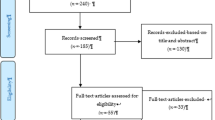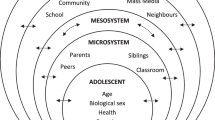Abstract
Adolescent delinquency and substance use are global problems. African American adolescents are especially susceptible to the life-changing consequences of these problem behaviors. Religiosity is a notable protective factor that has been shown to mitigate these behaviors. This study uses a person-centered approach to examine the extent to which religiosity is associated with lower rates of delinquency and substance use among urban African American adolescents in the United States. Latent Class Analysis was used to examine the heterogeneity in five religiosity items among a sample of adolescents ages 13–18. After identifying religiosity classes through a class enumeration process, we examined predictors of the classes using multinomial logistic regression. The classes were then used to predict several substance use and delinquency outcomes. Three religiosity classes were identified; “low religious beliefs and engagement,” (15.19%, n = 94), “religious with low active engagement,” (56.70%, n = 351), and “religious with high active engagement,” (28.11%, n = 174). Protective effects of religiosity on substance use (e.g., alcohol) and delinquency were found (e.g., assault). Implications for research and practice are discussed.


Similar content being viewed by others
References
Akers, R. L. (1985). Deviant behavior: A social learning approach (3rd ed.). Wadsworth.
Asparouhov, T., & Muthén, B. (2014). Auxiliary variables in mixture modeling: Three-step approaches using M plus. Structural Equation Modeling: A Multidisciplinary Journal, 21, 329–341. https://doi.org/10.1080/10705511.2014.915181
Baier, C. J., & Wright, B. R. E. (2001). “If you love me, keep my commandments”: A meta-analysis of the effect of religion on crime. Journal of Research in Crime and Delinquency, 38(1), 3–21. https://doi.org/10.1177/0022427801038001001
Barry, C. M., Nelson, L., Davarya, S., & Urry, S. (2010). Religiosity and spirituality during the transition to adulthood. International Journal of Behavioral Development, 34(4), 311–324. https://doi.org/10.1177/0165025409350964
Brown, T. L., Parks, G. S., Zimmerman, R. S., & Phillips, C. M. (2001). The role of religion in predicting adolescent alcohol use and problem drinking. Journal of Studies on Alcohol, 62(5), 696–705. https://doi.org/10.15288/jsa.2001.62.696
Centers for Disease Control and Prevention. (2018). Protective factors. https://www.cdc.gov/healthyyouth/protective/index.htm
Centers for Disease Control and Prevention. (2022). National Center on Birth Defects and Developmental Disabilities. https://www.cdc.gov/ncbddd/index.html.
Chadwick, A. B., Top, L. B., & McClendon, J. R. (2010). Shield of faith: The power of religion in the lives of LDS youth and young adults. Deseret Book.
Dodor, B. A., Robinson, M. A., Watson, R., Meetze, D., & Whicker, R., Jr. (2018). The impact of religiosity on substance abuse and obesity in African Americans. Journal of Religion and Health, 57(4), 1315–1328. https://doi.org/10.1007/s10943-017-0501-2
Farrington, D. P. (2003). Developmental and life-course criminology: Key theoretical and empirical issues-the 2002 Sutherland Award address. Criminology, 41(2), 221–225. https://doi.org/10.1111/j.1745-9125.2003.tb00987.x
Fox, A. R., Skalisky, J., Johnson, B., Noland, M., & Mezulis, A. (2020). Religious strength of faith and marijuana use frequency predict marijuana-related impairment in college students. Psychology of Religion and Spirituality, 14(2), 170–178. https://doi.org/10.1037/rel0000391
Gooden, A. S., & McMahon, S. D. (2016). Thriving among African American adolescents: Religiosity, religious support, and communalism. American Journal of Community Psychology, 57, 118–128. https://doi.org/10.1002/ajcp.12026
Grant, J. B., & Fletcher, K. D. (2018). Subjective religiosity and organized religiosity as a predictor of sexual affect among African Americans. The Hilltop Review, 11(1), 61–75. https://scholarworks.wmich.edu/hilltopreview/vol11/iss1/7
Haber, J. R., & Jacob, T. (2009). Mediation of family alcoholism risk by religious affiliation types. Journal of Studies on Alcohol and Drugs, 70(6), 877–889. https://doi.org/10.15288/jsad.2009.70.877
Hayatbakhsh, R., Clavarino, A., Williams, G. M., & Najman, J. M. (2014). Maternal and personal religious engagement as predictors of early early-onset and frequent substance use. The American Journal on Addictions, 23(4), 363–370. https://doi.org/10.1111/j.1521-0391.2014.12113.x
Hayward, G. M. (2019). Religiosity and premarital sexual behaviors among adolescents: An analysis of functional form. Journal for the Scientific Study of Religion, 58(2), 439–458. https://doi.org/10.1111/jssr.12588
Hirschi, T. (1969). Causes of delinquency. University of California Press.
Hirschi, T., & Stark, R. (1969). Hellfire and delinquency. Social Problems, 17, 202–213. https://doi.org/10.2307/799866
Iorfa, S. K., Ugwu, C., Ifeagwazi, C., & Chukwuorji, J. C. (2018). Substance use among youths: Roles of psychoticism, social alienation, thriving, and religious commitment. African Journal of Drug and Alcohol Studies., 17(2), 133–146. https://doi.org/10.4314/AJDAS.V17I2
Jallow, I. K., Britton, J., & Langley, T. (2017). Prevalence and determinants of tobacco use among young people in the Gambia. BMJ Global Health, 2(4), e000482. https://doi.org/10.1136/bmjgh-2017-000482
Jang, S. J., & Johnson, B. R. (2003). Strain, negative emotions, and deviant coping among African Americans: A test of general strain theory. Journal of Quantitative Criminology, 19, 79–105. https://doi.org/10.1023/A:1022570729068
Jang, S. J., & Johnson, B. R. (2004). Explaining religious effects on distress among African Americans. Journal for the Scientific Study of Religion, 43, 239–260. https://doi.org/10.1111/j.1468-5906.2004.00230.x
Jang, S. J., & Johnson, B. R. (2011). The effects of childhood exposure to drug users and religion on drug use in adolescence and young adulthood. Youth & Society, 43(4), 1220–1245. https://doi.org/10.1177/0044118x10393483
Jang, S. J., & Johnson, B. R. (2005). Gender, religiosity, and reactions strain among African Americans. Sociological Quarterly, 46, 323–358. https://doi.org/10.1111/j.1533-8525.2005.00015.x
Johnson, B. R., Larson, D. B., Jang, J. S., & Li, D. S. (2000b). The 'invisible institution' and black youth crime: The church as an agency of local social control. Journal of Youth and Adolescence, 29, 479–498. https://www.ojp.gov/ncjrs/virtual-library/abstracts/escaping-crime-inner-cities-church-attendance-and-religious
Johnson, B. R., Li, D. S., Larson, D. B., & McCullough, M. (2000c). Religion and delinquency: A systematic review of the literature. Journal of Contemporary Criminal Justice, 16, 32–52. https://www.ojp.gov/ncjrs/virtual-library/abstracts/systematic-review-religiosity-and-delinquency-literature-research
Johnson, J. G., Cohen, P., Smailes, E., Kasen, S., Oldham, J. M., Skodol, A. E., & Brook, J. S. (2000c). Adolescent personality disorders associated with violence and criminal behavior during adolescence and early adulthood. The American Journal of Psychiatry, 157(9), 1406–1412. https://doi.org/10.1176/appi.ajp.157.9.1406
Kelly, P. E., Polanin, J. R., Jang, S. J., & Johnson, B. R. (2015). Religion, delinquency, and drug use: A meta-analysis. Criminal Justice Review, 40(4), 505–523. https://doi.org/10.1177/0734016815605151
Longest, K. C., & Vaisey, S. (2008). Control or conviction: Religion and adolescent initiation of marijuana use. Journal of Drug Issues, 38(3), 689–715. https://doi.org/10.1177/002204260803800303
Masyn, K. E. (2013). Latent class analysis and finite mixture modeling. In T. D. Little (Ed.), The Oxford Handbook of Quantitative Methods (pp. 551–611). Oxford University Press. https://doi.org/10.1093/oxfordhb/9780199934898.013.0025
Mendolia, S., Paloyo, A.R., Walker, I. (2019). The effect of religiosity on adolescent risky behaviors. B.E. Journal of Economic Analysis & Policy, 19(3), 1–16. https://www.iza.org/publications/dp/11566/the-effect-of-religiosity-on-adolescent-risky-behaviors
Merrill, R. M., Salazar, R. D., & Gardner, N. W. (2001). Relationship between family religiosity and drug use behavior among youth. Social Behavior and Personality, 29(4), 347–357. https://doi.org/10.2224/sbp.2001.29.4.347
Michalak, L., Trocki, K., & Bond, J. (2007). Religion and alcohol in the U.S. National Alcohol Survey: how important is religion for abstention and drinking? Drug and Alcohol Dependence, 87(2–3), 268–280. https://doi.org/10.1016/j.drugalcdep.2006.07.013
Murray, B. N. (2011). "Does religiosity deter juvenile delinquency?" Electronic Theses and Dissertations, 2004–2019. 2087. https://stars.library.ucf.edu/etd/2087
Nasim, A., Utsey, S. O., Corona, R., & Belgrade, F. Z. (2006). Religiosity, refusal efficacy, and substance use among African American adolescents and young adults. Journal of Ethnicity in Substance Abuse, 5(3), 29–49. https://doi.org/10.1300/J233v05n03_02
Nguyen, & Newhill, C. E. (2016). The role of religiosity as a protective factor against marijuana use among African American, White, Asian, and Hispanic adolescents. Journal of Substance Use, 21(5), 547–552. https://doi.org/10.3109/14659891.2015.1093558
Pew Research Center. (2018). 5 facts about the religious lives of African Americans., Washington, D.C. https://www.pewresearch.org/fact-tank/2018/02/07/5-facts-about-the-religious-lives-of-african-americans/
Quinn, D., & Lewin, A. (2019). Family religiosity, parental monitoring, and emerging adults’ sexual behavior. Religions, 10, 114. https://doi.org/10.3390/rel10020114
Regnerus, M., Smith, C. A., & Fritsch, M. (2003). Religion in the lives of American adolescents. https://eric.ed.gov/?q=is&pg=60418&id=ED473896
Salas-Wright, C. P., Vaughn, M. G., Hodge, D. R., & Perron, B. E. (2012). Religiosity profiles of American youth in relation to substance use, violence, and delinquency. Journal of Youth and Adolescence, 41(12), 1560–1575. https://doi.org/10.1007/s10964-012-9761-z
Sharma, M., & Kanekar, A. (2008). Substance abuse in minorities. Journal of Alcohol and Drug Education, 52(3), 3–8. https://link.gale.com/apps/doc/A191264070/OVIC?u=txshracd2579&sid=bookmark-OVIC&xid=f6d928e9
Smith, C., & Denton, M. L. (2005). Soul-searching: The religious and spiritual lives of American teenagers. Oxford University Press.
Smith, S. J. (2015). Risky sexual behavior among young adult Latinas: Are acculturation and religiosity protective? The Journal of Sex Research, 52(1), 43–54. https://doi.org/10.1080/00224499.2013.821443
Steinman, K. J., & Zimmerman, M. A. (2004). Religious activity and risk behavior among African American adolescents: Concurrent and developmental effects. American Journal of Community Psychology, 33(3–4), 151–161. https://doi.org/10.1023/B:AJCP.0000027002.93526.bb
Vermunt, J. K. (2010). Latent class modeling with covariates: Two improved three-step approaches. Political Analysis, 18(4), 450–469. http://www.jstor.org/stable/25792024
Funding
This study was funded by the Center for Health Administration Studies and the STI/HIV Intervention Network at the University of Chicago, which were awarded to Dr. Dexter R. Voisin.
Author information
Authors and Affiliations
Corresponding author
Ethics declarations
Conflict of interest
The authors declare that there is no conflict of interest to disclose. All authors declare that they have no relevant financial interests to disclose.
Ethical Approval
The study was approved by the Institutional Review Board of the last author’s previous institution. The last author collected the data for the study, obtained informed consent from participants, and takes responsibility for the integrity of the data. The authors assume responsibility for the accuracy of the data analysis.
Consent to Participate
There were no ethical issues concerning human participants/animals in the study. Informed consent was obtained before the data collection.
Additional information
Publisher's Note
Springer Nature remains neutral with regard to jurisdictional claims in published maps and institutional affiliations.
Rights and permissions
Springer Nature or its licensor (e.g. a society or other partner) holds exclusive rights to this article under a publishing agreement with the author(s) or other rightsholder(s); author self-archiving of the accepted manuscript version of this article is solely governed by the terms of such publishing agreement and applicable law.
About this article
Cite this article
Fairclough, J., Abd-Elmonem, M., Merrin, G.J. et al. Religiosity and Associations with Substance Use and Delinquency Among Urban African American Adolescents. J Relig Health 63, 531–550 (2024). https://doi.org/10.1007/s10943-023-01916-2
Accepted:
Published:
Issue Date:
DOI: https://doi.org/10.1007/s10943-023-01916-2




